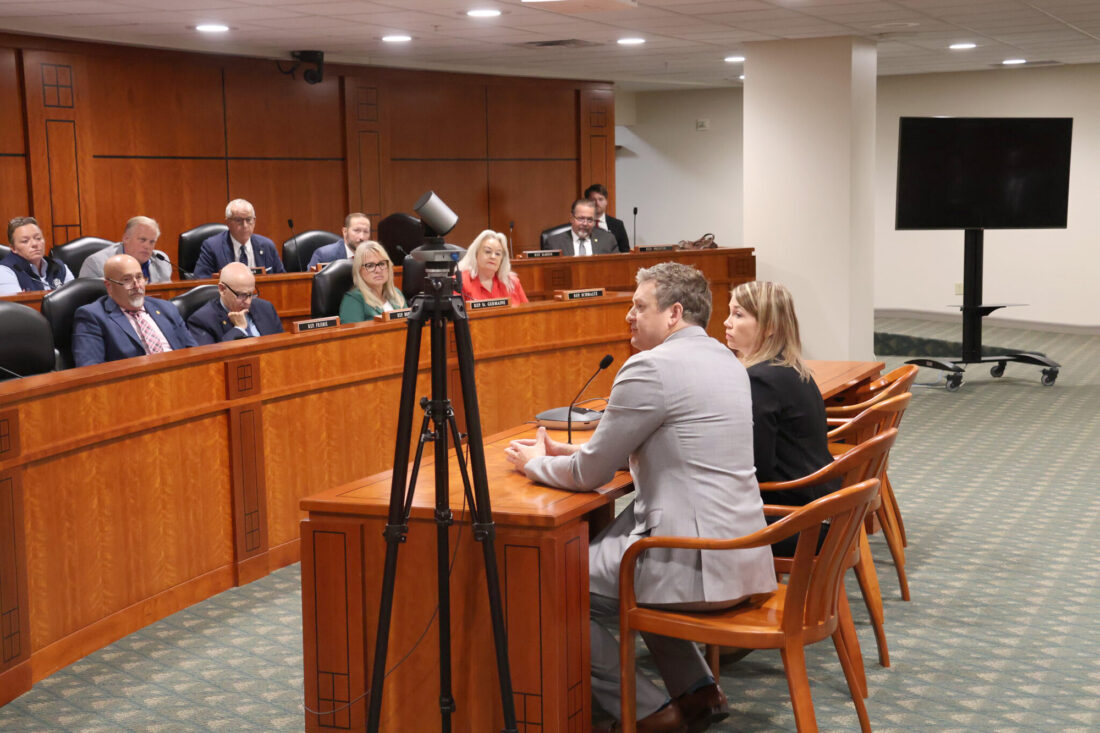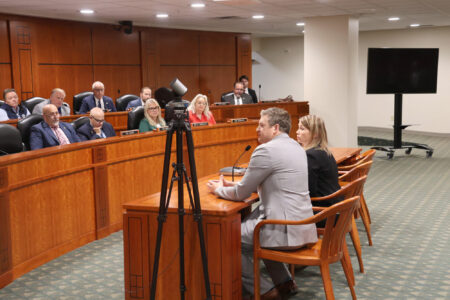Hearing on Michigan effort to protect federal drug discounts

Frank Waters, the senior director of policy and government affairs for the Michigan Primary Care Association, and Kelli Pardee, the Pharmacy Business Director at Great Lakes Bay Health Centers, testify Wednesday before the Michigan House Health Policy Committee. (Kyle Davidson/Michigan Advance)
Health care providers and drug manufacturers Wednesday hotly debated legislation looking to ensure hospitals can purchase drugs at a reduced price as part of a federal program intended to support facilities that care for uninsured or low-income patients.
Members of the Michigan House Health Policy Committee heard testimony on House Bill 4878, which the committee chair and sponsor, state Rep. Curt VanderWall, R-Ludington, called a common-sense response on a complicated topic.
The bill bars drug manufacturers, wholesalers and distributors from imposing conditions, restrictions, limits or outright bans on entities participating in the 340B drug pricing program and their contracting pharmacies that prevent them from acquiring certain medications at a discount.
Additionally, the bill aims to bring more transparency into the size and scope of the program in Michigan by requiring participants to report how much money they receive through the program, how much they pay pharmacies and consultants, their total profits and how much they spend on community care.
“We believe this reporting will give us a clear picture of the program in Michigan and gives a chance for our health care providers to brag about the impact they have on their communities, but it will also shine a light on whether there is, in fact, waste, fraud and abuse in this program,” VanderWall said.
VanderWall opened testimony on the bills by welcoming representatives from the Michigan Health and Hospital Association to discuss their support for the policy.
Chip Falahee, the senior vice president of legal and legislative affairs for Bronson Healthcare, said the program has enabled hospitals to stretch scarce federal resources across a wider group of people.
Participants consist of facilities who see a high percentage of Medicaid recipients, as well as children’s hospitals, cancer hospitals, rural referral centers and critical access hospitals, Falahee explained.
Facilities can use the money they save through 340B for a number of services, with Falahee pointing to investments in rural OB-GYN and cancer clinics, mental health and addiction services, and mobile clinics as some examples.
“In Bronson’s case, (to) give you a specific example, we use that money, those savings, to fund patient assistance programs to offer no charge medications to our low-income and uninsured patients. We also provide oncology medicines for our uninsured cancer patients,” Falahee said.
By protecting contract pharmacies from restrictions instituted by drug manufacturers, the bill allows the program to function as originally intended, Falahee said, emphasizing that the program runs on private dollars rather than federal funding.
However, representatives from the pharmaceutical industry argued the program has been exploited to generate profits for large hospital systems, pharmacy benefit managers and chain pharmacies, rather than acting as a safety net for hospitals.
Emily Gibellina, director of state government affairs for the Midwest region for the pharmaceutical research and development company AbbVie, argued the state had no business passing legislation on 340B, as it is a federal program.
She also argued the entities covered by the program are left to self-police their claims and manufacturers are required to pay out discounts on an honor system, without itemized receipts or insight into whether claims may be eligible, or duplicated.
Leslie Baldwin, the co-founder, CEO and president of the Michigan Rare Coalition, a nonprofit focused on advocating for individuals with rare disorders, raised similar transparency concerns, questioning how much money hospitals were making off 340B and how much of that money was going to support patients’ programs.
She also raised concerns about the bill’s language on transparency, which requires hospitals to report their 340B transactions to a hospital trade association contracted with the Michigan Department of Licensing and Regulatory Affairs.
“The current language allows the state hospital trade association to oversee the collection and reporting of data, as well as hiding the name of the hospitals that submit that information by de-identifying it. This undercuts the efforts to require meaningful transparency,” Baldwin said.
While opponents questioned whether 340B discounts were truly used to benefit patients, Frank Waters, the senior director of policy and government affairs for the Michigan Primary Care Association, emphasized the money saved is required to go back into patient care.
Opponents also credited the 340B program with driving up the cost of care, partly through the purchase of higher priced drugs over lower-cost generics, though Kelli Pardee, the Pharmacy Business Director at Great Lakes Bay Health Centers, said they are required to charge all insurance companies the same amount, with the exception of fee-for-service Medicaid.
“We don’t charge differently for a 340B drug than a non-340B drug because we can’t. We charge the same to everybody. And where we’re required to charge less, in the case of fee-for-service Medicaid, we make no dollars on those and we charge the state the 340B price,” Pardee said.
The committee did not vote on the policy, with VanderWall leaving the bill open to potential amendments after testimony.
———
Michigan Advance is part of States Newsroom, a national 501(c)(3) nonprofit. For more, go to https://michiganadvance.com.




